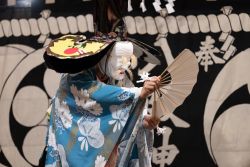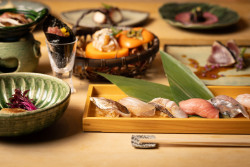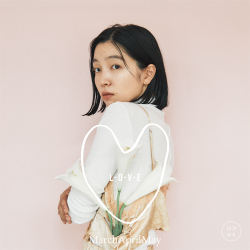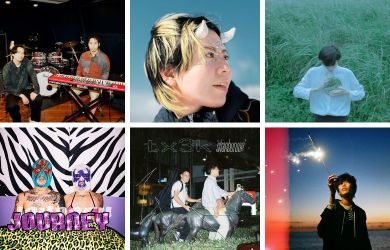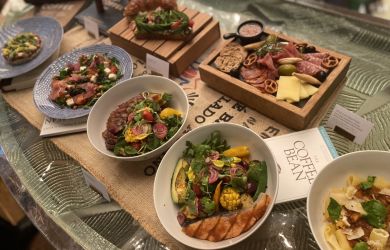
December 17, 2009
Taster’s Choice
Six New Year’s gift ideas for that hard-to-please sake connoisseur
By Metropolis
Originally published on metropolis.co.jp on December 2009

Photo by Kohji Shiiki
Type: Junmai daiginjo; yamahai
Brewery: Miyasaka Jozo, Nagano Prefecture (www.masumi.co.jp)
Masumi is a wonderful mid-sized brewer in Nagano with an overall light and soft style, yet its lineup is also peppered with pleasantly bold exceptions. Widely distributed, these sake are dependable and well-received. Masumi is also well-known as the brewery where Yeast No. 7 was discovered. All the rage back in the ’40s, No. 7 later became the most commonly used yeast for non-ginjo sake. The recent trend has been toward fruitier aromas, but this product, a junmai daiginjo, eschews flamboyant modern yeasts for the more demure classic variety. Seeing as Nana-go is a yamahai to boot, the yeast lends a certain gaminess, yet overall the sake is clean, just a smidgeon rich, delicate and restrained.
¥3,360 (720ml) at Ginza Matsuya and others.
Type: Daiginjo
Brewery: Kikuhime Goshi Gaisha, Ishikawa Prefecture (www.kikuhime.co.jp)
Normally, I wouldn’t pay this much for a sake—or I should say, this is my upper limit. But “BY” is surely worth it. For its style, it’s close to flawless. Typical of the Hakusan region (if not most of Ishikawa Prefecture), the flavor is full, broad and rich, but the finish is remarkably fast. On top of that, the maturity of this sake, aged for a full year before release (“BY” refers to “brewing year”), brings out the most of the certified top-quality Yamada Nishiki rice. It is bold yet restrained, assertive yet fine-grained, with mild autumnal fruit suffusing the aromas and flavors, and wrapped all together. Exquisite.
¥5,000 (720ml) or ¥10,000 (1.8l) at Tokyu (Shibuya station) and others.
Type: [not designated]
Brewery: Kenbishi Shuzo, Hyogo Prefecture (www.nadagogo.ne.jp/kura/kenbisi.html)
Kenbishi, one of the largest sake producers in Japan, has been a prestigious name in the industry for centuries. The brewer behind the ubiquitous double-black-diamond logo was founded in 1505, and besides being extremely traditional, is a bit secretive as well. Which is fine, methinks. Kenbishi makes only a handful of products, and all of the packaging is similar. Be sure to get the one whose label says Kuromatsu Kenbishi “Tokusen” and costs ¥2,291 (right), and you’ll be golden. This sake is slightly rich and even smoky, yet light enough (read: not the least bit cloying) to be enjoyed in good amounts. It’s also extremely adaptable—you can serve it chilled, at room temperature or slightly warmed.
¥2,291 (1.8l), available at most liquor shops.
Type: Honjozo
Brewery: Takagi Shuzo, Yamagata Prefecture
Well, for years I have been saying that this sake was basically impossible to buy retail. It’s just too popular, the distribution routes are limited, and what is available goes to izakaya and restaurants first. In most cases, that situation continues. But the brewer can’t control everything all the time, and a few bottles slip through the cracks. If you simply must have Juyondai “Honmaru,” you can buy it at Big Ginza Ichi-go Ten. Is it delicious? Certainly. But note, the normal price is about ¥2,300 for this honjozo. You make the call.
¥13,440 at Big Ginza Ichi-go Ten.
Type: Daiginjo
Brewery: Doi Shuzoba, Shizuoka Prefecture (www.kaiunsake.com)
Here is another sake that’s becoming rarer by the moment—it’s likely that you won’t be able to enjoy it in a couple more months. Kaiun brewery, that stalwart of sake goodness from Shizuoka, isn’t going anywhere, but this sterling, clean, fruity yet focused and sharp daiginjo will soon no longer be available—it was named after the toji, who passed away a couple of months ago. Sure, the new brewmaster may make the same product next year, but it will not bear the same name, nor be made by the legend that was Hase-san.
¥4,725 (720ml). Available for order at Ginza Mitsukoshi.
Type: Junmai ginjo
Brewery: Kumamoto Ken Shuzo Kenkyu Jo (Kumamoto Prefecture Sake Research Center)
Kumamoto produces more shochu than sake, and this brewery was founded in 1910 as a research center for improving the nihonshu of the region. Even today, it’s collectively owned by all the breweries in the prefecture. This is where the mighty Yeast No. 9, perhaps the most commonly used yeast for premium ginjo sake, was first isolated, and the light, bright, melon-laced nature of Koro represents that style well. To me, this is the “Pilsner Urquell” of the sake world—a classic drink that’s easy for non-connoisseurs to appreciate, yet far from ostentatious or bold.
¥2,833 at Daimaru (Tokyo station) and others.
Big Ginza Ichi-go Ten 7-4-14 Ginza, Chuo-ku. Tel: 03-3573-0303. Open Mon-Fri: 10am-4am, Sat 11am-9pm, Sun 11am-7pm. Nearest stn: Ginza. www.ginza.info/S63257.html
Daimaru (Tokyo station) 1-9-1 Marunouchi, Chiyoda-ku. Tel: 03-3212-8011. Open daily 10am-8pm. Nearest stn: Tokyo. www.daimaru.co.jp
Ginza Matsuya 3-6-1 Ginza, Chuo-ku. Tel: 03-3567-1211. Open daily 10am-8pm. Nearest stn: Ginza. www.matsuya.com
Mitsukoshi 4-6-16 Ginza, Chuo-ku. Tel: 03-3562-1111. Open daily 10am-8pm. Nearest stn: Ginza. http://ginza.mitsukoshi.co.jp
Tokyu (Shibuya station) 2-24-1 Shibuya. Tel: 03-3477-3111. Open daily 10am-9pm. Nearest stn: Shibuya. www.tokyu-dept.co.jp


